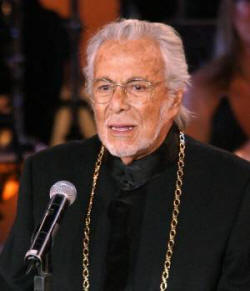

Partner Angel Fernandez Vinas
 Ernesto Alonso (February 28, 1917 – August 7, 2007) was a Mexican producer, director, cinematographer and actor. He was nicknamed "El Señor Telenovela" ("Mr. Soap Opera") because most of his work centered on telenovelas known around the world.
His partner, Angel Fernandez Vinas, died in 1977.
Ernesto Alonso (February 28, 1917 – August 7, 2007) was a Mexican producer, director, cinematographer and actor. He was nicknamed "El Señor Telenovela" ("Mr. Soap Opera") because most of his work centered on telenovelas known around the world.
His partner, Angel Fernandez Vinas, died in 1977.
Ernesto began his career as an uncredited extra in La Zandunga (1938), a movie starring Lupe Vélez. He then appeared in 1939's "Papacito Lindo". His popularity grew as he starred in many films of the 1940s, including "La Gallina Culeca", "Historia de una gran Amor", "El Padre Morelas", "El Jorobado", "La Corte del Faraon", "Marina", "El Gallero", and "El Precio de la Gloria" in which he starred with his brother Alfonso Ramírez Alonso. He made another series of films throughout the 1950s, including as the narrator of Los Olvidados (1950) and the lead in Ensayo de un crimen (1955), both directed by Luis Buñuel. However, it wasn't until the 1960s that Ernesto began appearing in telenovelas. His first was "Cartas de amor" (1960) which also starred another rising star Angélica María. Ernesto from there on only came out in telenovelas including "Leyendas de Mexico" opposite Jacqueline Andere, with whom he worked a lot in both films and telenovelas. Alonso's most memorable performance was as Enrique de Martino in the 1983 telenovela El Maleficio in which he played a devil-like character.[1] His last acting appearance was in the telenovela Entre el Amor y el Odio (2002) in which he played Father Abad. Ernesto only made one film between those years, 1986's El Maleficio II.
Indicative of the relative freedom with which well-heeled homosexuals led their lives in Mexico City are the cases of the children of multimillionaire entrepreneurs and celebrities chronicled in society pages. Alberto Maus Santander, heir to a tobacco and real estate fortune, grew up in a progressive and cosmopolitan home. Born in 1925, he came of age in the 1940s, when prominent gays like Salvador Novo and Roberto Montenegro frequently visited his family. Alberto – known to everyone as Beto – dabbled in the arts and dreamed of studying abroad. In preparation, over the spring of 1960, he watched his figure and dieted, partaking only of steak and salad. Novo announced in his weekly column on 5 November 1960 that Beto planned to study interior decoration in Paris. Novo further noted ‘in fact, his family is to dine in the home of the young man who is to accompany Beto to Paris’. After his father’s death left him a substantial inheritance, Beto left the family home to install himself in a modern high-rise bachelor’s apartment on Insurgentes Avenue. Novo’s readers followed his move, his interest in interior design and learned of his talented cooking and entertaining.
Beto’s elegant eighth-floor apartment was two floors above that of his close friend and classmate Enrique Álvarez Félix, sole son of famed actress María Félix. ‘Quique’ to his friends, Álvarez Félix lived in a comfortable flat. It was ‘modern’, Novo noted, ‘but without the odd furniture that young people prefer’. Green velvet coverings on the sofas and chairs matched the green carpet and contrasted with the straw-coloured wallpaper. Many antiques, on loan from his mother’s Hacienda de Catipoato, softened the modern lines of the apartment’s finishings. Álvarez Félix frequently entertained at home with the help of his mother and her trusted confidante, the gay designer Armando Valdés Peza. Newspaper columns enumerated his guests, surreptitiously recording the unspoken intimacy of homosexual couples named among married heterosexual couples, as occurred in 1959, when Novo noted in his column that television producer Ernesto Alonso arrived with Angel Fernandez Vinas. Decades later, it was revealed that Alonso and Fernandez were lifelong companions, and had adopted two children whom they raised as their own, in an effort to construct an image of normalcy that would keep viewers of his television programmes from being scandalised by his homosexuality.
Ernesto directing, produced and even starred in his own telenovelas sometimes. 1960's "Espejo de Sombras" was his first job as a director and he even produced it, but his first producing job was "Cuidado con el Angel" that very same year. Ernesto then made many memorable telenovelas including "La Leona", "La Cobarde", both of which he directed, produced and starred in. His last job as a director was the series "Cumbres Borrascosas" (1979) which was a telenovela version of an Emily Brontë novel. Ernesto then went to continue his career has a producer, producing twenty-five telenovelas throughout the 1980s, nine throughout the 1990s, and four in the 2000s. His last producing work being the telenovela "Barrera de Amor" which starred Yadhira Carrillo and Raquel Olmedo. Ernesto was awarded the Special Golden Ariel at the Ariel Awards in 2006 for his amazing career and contributions.
Ernesto Alonso died at the age of 90 at his home in Mexico City.[2] Being kept in a hospital, sources say he knew he was passing, and that he wanted to spend his last moments in his home. In the end Ernesto Alonso acted in sixty-three films, directed forty-three films and telenovelas, but he would be most remembered for producing 158 telenovelas throughout his long career.
My published books: